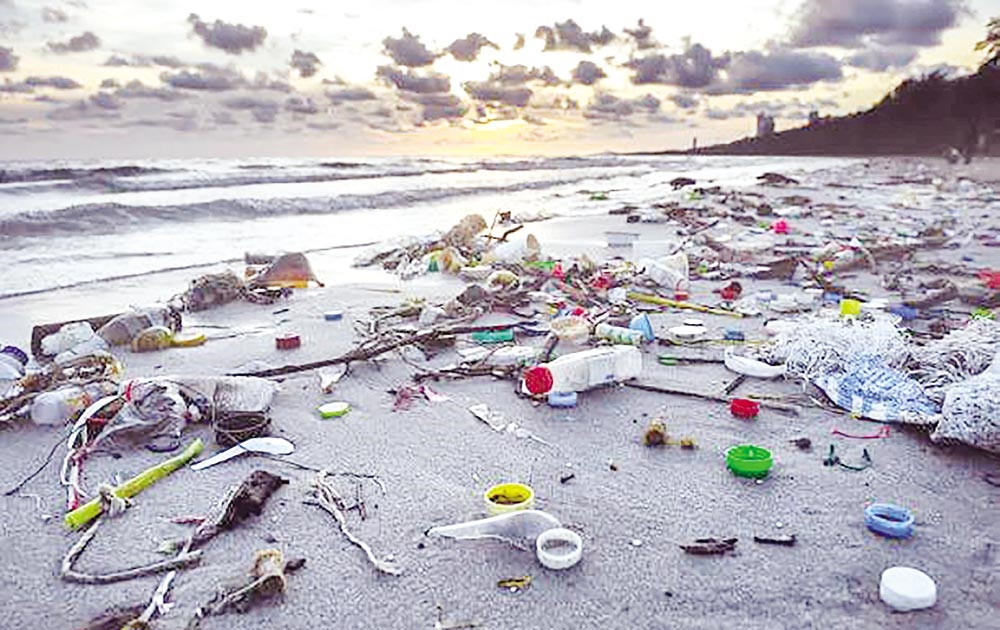‘Reduce, reuse, recycle’ can help combat plastic pollution
PARVEZ BABUL | Source : Daily Observer, 27 January 2025

I was traveling to Barisal, a southern coastal district in Bangladesh, 180 kilometers away from the capital city Dhaka. I was a member of a foreign three-member delegation team of Bread for the World https://www.bread.org/, an America-based international voluntary organization. Our purpose of field visit was to make a documentary of successful poor women beneficiaries of homestead food production project at the local villages as part of the climate change adaptation and women empowerment.
A pilot project ofNature-based sustainable solutions to climate change adaptation, and it was working excellent. My role was to cover the issues in our newspaper and to interpret the language from Bangla to English and English to Bangla of the women project beneficiaries and the delegation.
We were traveling by a water vessel/ launch from Dhaka launch terminal Sadarghat to Barisal. That was not an enjoyable launch trip, because while we were crossing the big river Buriganga-- we observed the poisonous polluted water that was life-threatening for the people. Plastics and other elements contaminated the river and made it unusable. It was as the phrase as the poet Samuel Taylor Coleridge wrote in his poem The Rime of the Ancient Mariner: "Water water everywhere, but not a drop to drink!"
So the plastic pollution, climate change, air pollution, soil pollution and other issues were in our table of discussion during the gloomy journey.
Several national and international seminars, conference and round table discussions that were held in recent years, and different research and studies show that Dhaka is one of the top cities in the world with the worst air quality. A new study by the Centre for Research on Energy and Clean Air (CREA) last week revealed that air pollution kills 102,456 people in Bangladesh every year. Mismanaging and burning plastic waste is one of the main reasons behind it.
Lack of awareness has led to the collection of plastic waste all over the cities. It is especially near rivers or lakes, where they mix with water and soil, affecting ecosystems and food chains.
The World Bank shared a report in 2021 mentioned that the last 15 years, Bangladesh's annual per capita plastic consumption in urban areas tripled to nine kg in 2020 from three kg in 2005. COVID-19 pandemic has worsened plastic pollution. The COVID-19 crisis has only exacerbated conditions, especially from single-use plastic used in masks, gloves, and Personal Protective Equipment.
A large part of the plastic waste is dumped in landfills, water bodies, and rivers. With rapid growth and urbanization, Bangladesh faced a sharp increase in both plastic use and pollution. Mismanaged plastic wastes are polluting cities, countryside, rivers, and canals. They clog drains, causing urban flooding.
Dhaka faces higher plastic pollution than other cities. The capital Dhaka's annual per capita plastic consumption is more than three times the national average for urban areas and stands at 22.25 kg. About 646 tons of plastic waste is collected daily in Dhaka, which is 10 percent of all wastes generated in Bangladesh. Only 37.2 percent of the plastic waste in Dhaka is recycled.Bangladesh is one of the top plastic polluted countries due to mismanagement of plastic waste.
Center for Policy Dialogue, a think tank in Bangladesh highlighted that the production of plastic products needs to be minimized as recycling alone is not sufficient to tackle plastic pollution. City corporations bear a substantial amount of the clean-up cost due to indiscriminate disposal of single-use plastic products. In Bangladesh, there is a potential to create a circular market for single-use plastic products if there is a proper network between waste collectors or local recycling shops and plastic manufacturers.
Bangladesh to lose $570m every year due to climate change.Plastics generated 1.8 billion tonnes of greenhouse gas emissions in 2019 that's 3.4 per cent of the world's total emissions, a number that is set to grow considerably as the production of plastics is expected to triple by 2060. Plastic pollution can alter habitats and natural processes, reducing ecosystems' ability to adapt to climate change, directly affecting millions of people's livelihoods, food production capabilities and social well-being.
The overall scenario of the country paints a more alarming landscape. The piling up of plastic waste is a worrisome development as it can have severe environmental consequences. This certainly contributes to the increasing temperature, which in turn can facilitate plastic waste in generating more harmful gases, including ethylene and methane, which can further push the temperature higher, creating a nightmarish cycle of destruction.
Plastic pollution is also a significant contributor to climate change, responsible for an estimated 1.8 billion tonnes of greenhouse gas emissions annually. Landfill emissions such as methane - over 80 times more potent than CO? in the short term - can be drastically reduced through GPAP's systemic approach to waste management.
Moreover, much of the world's plastic pollution is generated by single-use products such as bottles, caps, cigarettes, shopping bags, cups, and straws. Pollution sources are mainly land-based, coming from urban and storm water runoff, littering, industrial activities, tyre abrasion, construction, and agriculture.
The 29th United Nations Climate Change Conference (COP) 29 of UNFCCC in Baku, Azerbaijan in November 2024 explored how to address plastic pollution and climate change. The conference gave emphasize oneffective partnerships to address plastic pollution.
Sustainable Development Goal (SDG) #12 of the United Nations initiatives to reduce the production and consumption of plastics by 2030. Experts and environmentalist observed that the states must work together through national, regional and global partnership sharing knowledge and experience to combat plastic pollution and climate change.